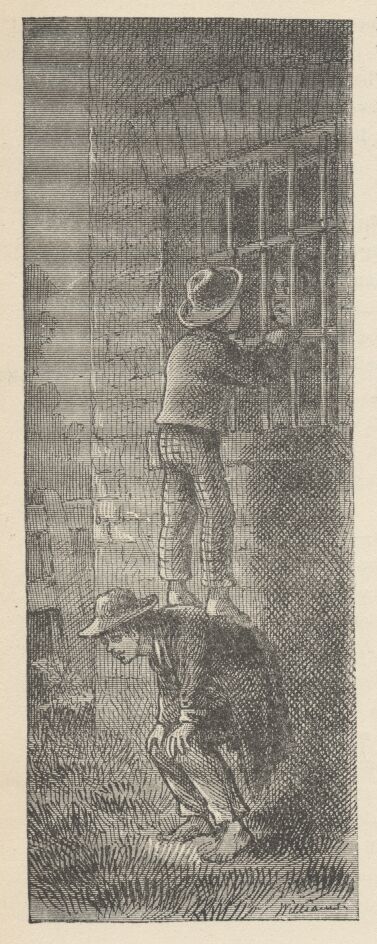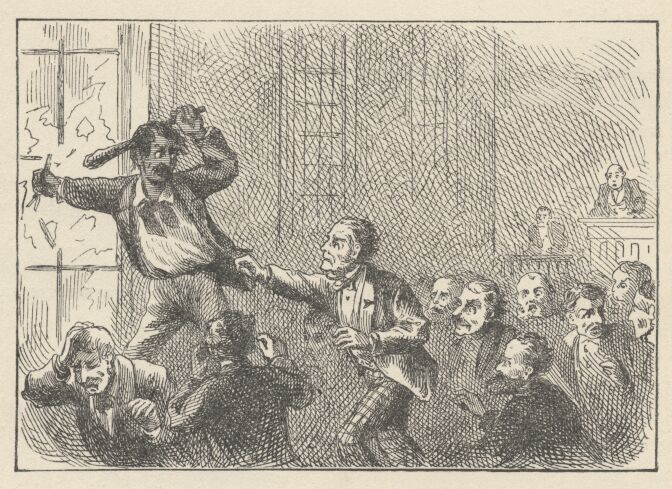Unfortunately, unlike the novel, neither film clip is funny, focusing only on the dramatic. In fact, even in the novel, many readers might miss what makes this funny. The novel requires a long set-up: Tom and Huck swear not to tell anyone what they'd seen in graveyard--the murder of a man killed not by the drunk Muff Potter, who was to drunk to know what happened, although he's the one on trial. The boys try to befriend Potter in his final hours in jail before the trial --a trial where the defense attorney doesn't even bother cross-examining the witnesses.
Before they enter the courtroom, Tom and Huck have this exchange, reaffirming, reemphasizing everything the novel has laid out [from Chapter 23]:
So Muff Potter's a good man, which makes us readers want to see him freed, but Tom and Huck want to keep their necks, so Twain has them swear again because "It's more surer." A grammar faux pas said with boldness and solemnity--rather, dread solemnity. The contrast of their boyish youth with this lofty abstraction makes the moment stand out. It's not a knee slapper, but likely to remind adults of how over-seriously they took their youth when young."Huck, have you ever told anybody about—that?""'Bout what?""You know what.""Oh—'course I haven't.""Never a word?""Never a solitary word, so help me. What makes you ask?""Well, I was afeard.""Why, Tom Sawyer, we wouldn't be alive two days if that got found out. You know that."Tom felt more comfortable. After a pause:"Huck, they couldn't anybody get you to tell, could they?""Get me to tell? Why, if I wanted that halfbreed devil to drownd me they could get me to tell. They ain't no different way.""Well, that's all right, then. I reckon we're safe as long as we keep mum. But let's swear again, anyway. It's more surer.""I'm agreed."So they swore again with dread solemnities."What is the talk around, Huck? I've heard a power of it.""Talk? Well, it's just Muff Potter, Muff Potter, Muff Potter all the time. It keeps me in a sweat, constant, so's I want to hide som'ers.""That's just the same way they go on round me. I reckon he's a goner. Don't you feel sorry for him, sometimes?""Most always—most always. He ain't no account; but then he hain't ever done anything to hurt anybody. Just fishes a little, to get money to get drunk on—and loafs around considerable; but lord, we all do that—leastways most of us—preachers and such like. But he's kind of good—he give me half a fish, once, when there warn't enough for two; and lots of times he's kind of stood by me when I was out of luck.""Well, he's mended kites for me, Huck, and knitted hooks on to my line. I wish we could get him out of there."
Without a comment from Twain, Tom's called to the stands. Tom stammers. The lawyer seems to know everything. How? Has someone ratted them out?
Actually, no. As we learn in Chapter 24, Tom himself did the ratting to the lawyer, before the swearing of dread solemnities. Again, not a knee slapper, but the kind of clever that observant readers enjoy. It might put a smile on their faces.
You could complain about Twain's manipulation of POV, withholding information unfairly, but it works, and most readers will willingly go along with it as it enhances the humor.


















